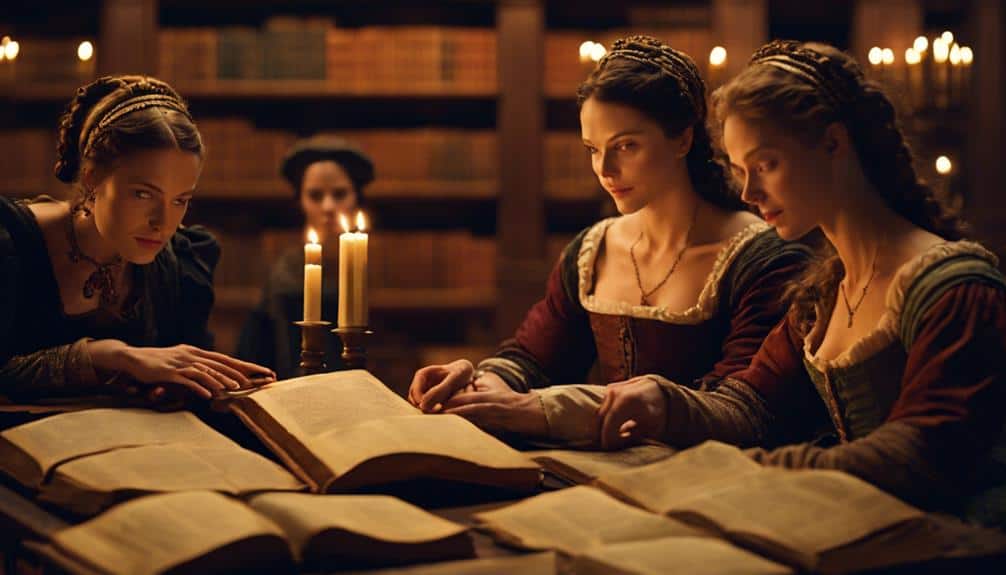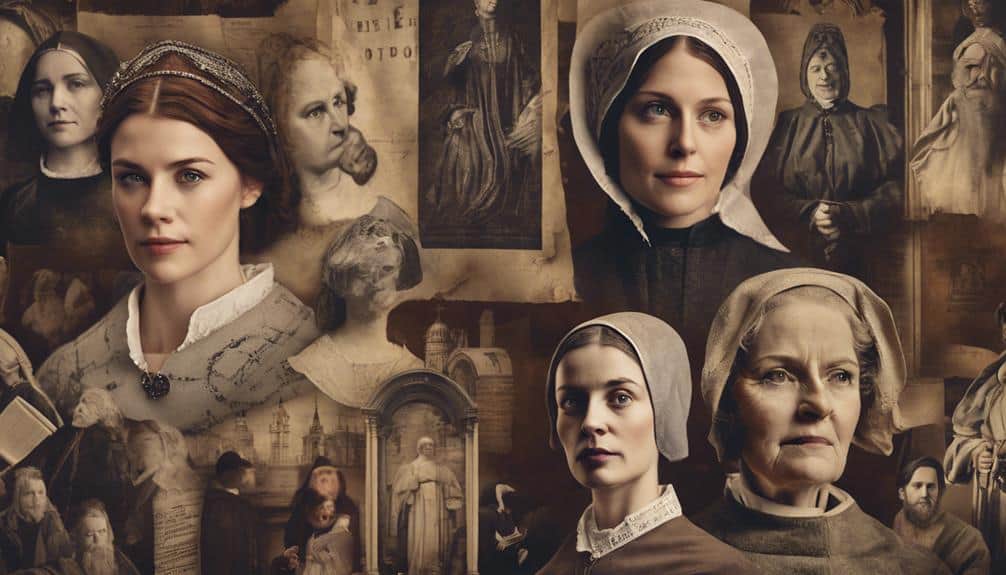Meet the unsung heroines of the Reformation—women like Katharina von Bora, Katharina Schütz Zell, and Olympia Fulvia Morata—who defied societal norms to support Protestant ideas and advocate for women's rights to interpret Scripture.
Discover how their remarkable contributions and resilient spirits fundamentally reshaped the movement and left an indelible mark on history.
Pioneers of Faith
Challenging societal norms and supporting Protestant ideas, women like Katharina von Bora, Katharina Schütz Zell, and Olympia Fulvia Morata played pivotal roles in the Reformation. These pioneers of faith didn't just accept the status quo; they actively sought to reshape it. By engaging in theological discussions and publishing works on faith, they significantly contributed to the movement. Their actions weren't merely passive support but active involvement that helped shape Protestant ideas.
Katharina von Bora, for instance, was instrumental in organizing and managing the household of Martin Luther, thereby allowing him to focus on his reformative work. Katharina Schütz Zell used her writing to defend Reformation ideas and provide spiritual guidance, breaking away from traditional gender roles. Olympia Fulvia Morata, a scholar, wrote extensively on Protestant doctrines, deeply influencing theological thought.
These women faced substantial opposition but persevered, leaving a remarkable legacy that continues to highlight the essential role of women in the Reformation. Their contributions weren't just of their time but have enduring relevance.
They demonstrated that women could be powerful agents of change, challenging societal norms and advancing faith in profound ways.
Overcoming Adversity

Women like Katharina von Bora, Katharina Schütz Zell, and Olympia Fulvia Morata faced substantial societal and institutional barriers, yet they persisted in making noteworthy contributions to the Reformation. These Reformation Women: Sixteenth-Century Figures Who Shaped Christianity's Rebirth had to navigate a society that expected women to remain in traditional roles, primarily within the domestic sphere.
Ex-nuns like von Bora faced immense pressure to marry, and educational opportunities for women were scarce.
Despite these constraints, these figures who shaped Christianity's transformation exhibited remarkable resilience. Katharina von Bora, for instance, not only supported her husband Martin Luther but also managed their household, which became a hub for Reformation ideas.
Katharina Schütz Zell defied norms by preaching and writing extensively to promote Protestant beliefs. Similarly, Olympia Fulvia Morata's scholarly works and translations made notable contributions to the theological discourse of the time.
Their efforts in overcoming adversity were pivotal in educating people about faith and challenging prevailing societal norms. These women's involvement in theological discussions and publishing had a lasting impact, demonstrating their essential role in the Protestant Reformation.
Their legacy underscores how their determination helped shape Christianity's rebirth.
Theological Contributions

The perseverance of these women in overcoming societal barriers extended into their substantial theological contributions, shaping the Reformation's doctrinal landscape. In the sixteenth century, Reformation women like Katharina Schütz Zell, Marie Dentière, and Argula von Grumbach made significant strides in Reformed theology by engaging deeply with the Word of God.
Schütz Zell, for example, corresponded with Martin Luther and took part in theological discussions that influenced the Reformation. Her writings and dialogues showcased a profound understanding of Reformed theology.
Marie Dentière advocated vehemently for women's rights to interpret and teach Scripture, emphasizing that the Word of God was accessible to all believers, regardless of gender. Her theological arguments challenged the restrictive norms of her time.
Argula von Grumbach boldly wrote pamphlets condemning the church's abuse of power, directly addressing the hypocrisy she saw. Her correspondence with Luther further highlighted her theological acumen and commitment to reform.
These women's contributions can be summarized in three key points:
- Engagement in theological discussions with prominent reformers.
- Advocacy for women's rights to interpret and teach Scripture.
- Condemnation of church abuses through theological writings.
Their work undeniably shaped the theological landscape of the Reformation, leaving a lasting impact on the movement.
Lasting Legacies

In examining the lasting legacies of Katharina von Bora, Katharina Schütz Zell, and Olympia Fulvia Morata, it's clear their theological contributions greatly influenced the Reformation and its enduring impact. These Reformation Women: Sixteenth-Century Figures didn't just support Protestant ideas; they actively shaped the Reformation by challenging societal norms that often excluded women from theological discourse.
Katharina von Bora's role extended beyond being Martin Luther's wife; she managed their household, which became a hub for Reformation activities.
Katharina Schütz Zell authored numerous pamphlets defending Protestant ideas, directly engaging in theological debates.
Meanwhile, Olympia Fulvia Morata's scholarly work and translations of classical texts into vernacular languages made theological knowledge more accessible, inspiring others to participate in these critical discussions.
Their perseverance in the face of opposition underscores their importance. These women not only defied societal norms but also laid the groundwork for future generations to engage in theological and scholarly pursuits.
Their lasting legacies highlight the significant contributions women made in shaping the Reformation movement, demonstrating that their impact extends well beyond their lifetimes. By understanding their stories, you can better appreciate the critical roles women played in advancing Protestant ideas and influencing theological thought.
Inspirational Stories

Countless accounts of these women's resilience and determination provide a rich tapestry of inspirational stories illustrating their pivotal roles in the Reformation. Women like Katharina von Bora, Katharina Schütz Zell, and Olympia Fulvia Morata made significant contributions that not only supported Protestant ideas but also reshaped societal norms.
- Katharina von Bora: As Martin Luther's wife, she managed their household, supported his theological work, and provided him with emotional and intellectual companionship. Her organizational skills and intellect were essential in advancing the Reformation.
- Katharina Schütz Zell: She actively engaged in theological discussions, wrote extensively defending Protestant beliefs, and offered sanctuary to persecuted Reformers. Her writings and actions challenged the traditional roles of women and highlighted their intellectual capabilities.
- Olympia Fulvia Morata: A scholar and writer, she disseminated Protestant ideas through her works and correspondences. Despite facing opposition and exile, she continued to advocate for Reformation principles.
These women faced numerous challenges, yet their legacy endures as a source of inspiration. They broke barriers in education, theology, and societal expectations, demonstrating the indispensable role of women in the Reformation.
Their stories underscore the enduring impact of their contributions and the challenges they overcame.


